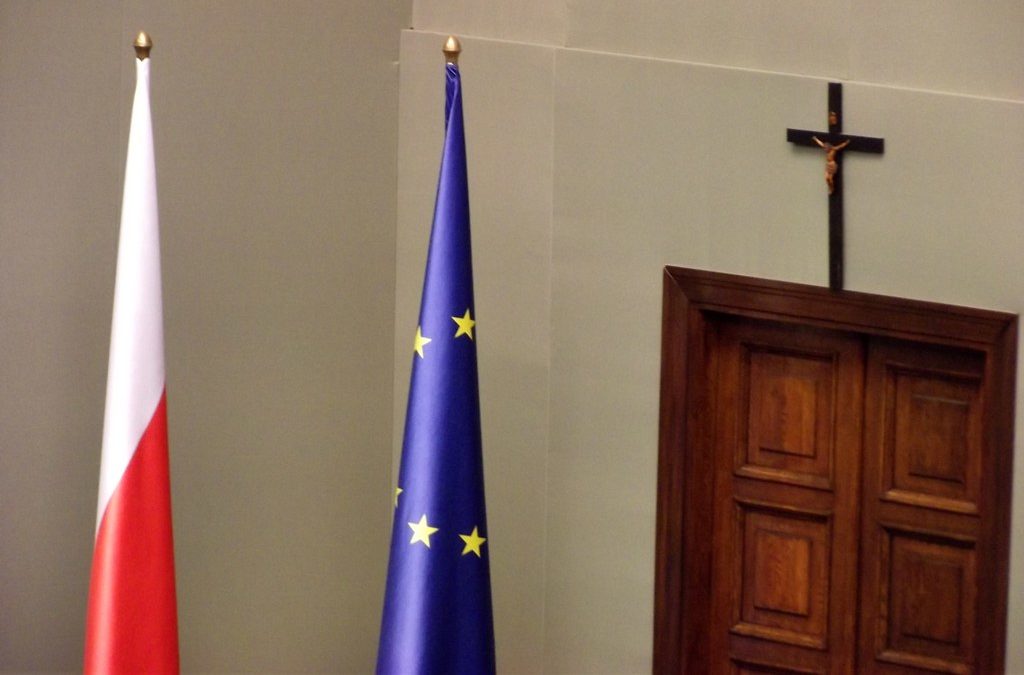Newly elected left-wing MPs have revived an old debate by calling for the removal of a Christian cross that hangs in Poland’s parliament.
“We have people of different denominations in the Sejm; we have people who are non-believers. The Sejm is a public space, a place of law making for all citizens. I believe that there should not be a cross in such a place,” said Magdalena Biejat, deputy head of the Left’s parliamentary caucus, in an interview with website Gazeta.pl.
The cross she is referring to has hung in the main chamber of the Sejm since 1997, when it was installed without permission during the night by two MPs from the now-defunct Solidarity Electoral Action party. The cross was a gift from the mother of Jerzy Popiełuszko – a priest murdered by communist security agents – having previously lain at his grave.
Biejat’s words quickly won support from party colleagues. Another Left MP, Andrzej Rozenek, said it was time “to take seriously” article 25 of Poland’s constitution, which requires that “public authorities be impartial in matters of religious conviction” and calls for “mutual independence” between church and state.
The head of the Left’s parliamentary caucus, Krzysztof Gawkowski, argued that either symbols of every faith should be displayed in the chamber, or none at all, reports TVP Info. Another Left MP, Krzysztof Śmiszek, said that such a request may be officially submitted to the speaker of the Sejm, Elżbieta Witek.
Any such request would inevitably be met with a negative response from Witek and the ruling conservative Law and Justice (PiS) party from which she hails. The cross will be removed “over my dead body”, said PiS MP Jacek Ozdoba.
Government spokesman Piotr Müller, in an interview with TVP, later confirmed that “the cross will remain” as a symbol of “our respect for tradition, including the Christian roots of Poland”.
Janusz Korwin-Mikke, a leader of the far-right Confederation, suggested that perhaps the Left would instead “like to place a Star of David, a crescent, or a hammer and sickle there”. His alliance entered parliament this year on an anti-Jewish, anti-Muslim and anti-communist platform.
Figures from the centrist Civic Platform (PO) party sat on the fence, suggesting that this is not something worth fighting over. Michał Szczerba, a PO MP, noted that the cross was initially hung without permission but said that he has “got used to it” and “there are more important matters” to deal with.
He accused the Left of distracting attention with unnecessary debates over issues such as religious symbols and obtaining feminine endings for their job title instead of fighting for better healthcare and protection of pensioners.
A group of female MPs have won the right to officially be named as "posłanka", the feminine term for their position, rather than "poseł", the masculine form that is normally used to refer to all MPs regardless of sex https://t.co/zRQfYymZli
— Notes from Poland ?? (@notesfrompoland) November 26, 2019
The parliamentary cross has been the subject of debate right from the start. The morning after it was first hung in 1997, the Democratic Left Alliance (SLD, now one of the members of the current Left alliance) filed a formal protest. In 2011, the liberal, anti-clerical Palikot’s Movement (some of whose former figures are now involved with the Left) sought to have it removed.
However, all such efforts have been unsuccessful, and the cross also appears to have public support. An opinion poll in 2011 by TNS OBOP found that 70% of respondents supported keeping it in parliament, with only 20% opposed.
Although Poland’s constitution calls for an “autonomy” between church and state, in practice Christian symbols are often found in public institutions such as schools. The state also effectively subsidises certain religious activities, such as religion classes in schools, which are in most cases Catholic catechism lessons run by the church but funded by the state.
The Left – an alliance of the SLD with the smaller Spring (Wiosna) and Together (Razem) parties – entered the Sejm following October’s elections, ending a four-year term in which there had been no left-wing representation in parliament at all. Its programme promised to end state support for the church.
Poland remains one of the most religious countries in Europe. But there is evidence of secular trends. Data from Pew Research show that Poland has the largest decline in religiosity from the older to the younger generation among any of the countries surveyed. The proportion of Polish children attending religion classes (which are optional) has fallen from a peak of 93% in 2010 to 70% last year.
Poland has the biggest decline in religiosity from the older to the younger generation among any of the countries surveyed by @pewresearch https://t.co/oAA9tBfSr4
— Notes from Poland ?? (@notesfrompoland) October 18, 2019
Main image credit: Piotr Drabik/Flickr (under CC BY 2.0)

Daniel Tilles is editor-in-chief of Notes from Poland. He has written on Polish affairs for a wide range of publications, including Foreign Policy, POLITICO Europe, EUobserver and Dziennik Gazeta Prawna.




















